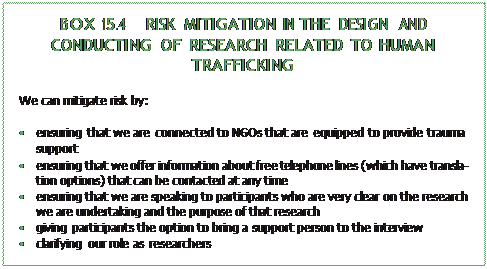 |
Ethics: being prepared
|
|
|
|
Within every university setting, there is a formal ethics body that governs proposed research and determines whether the design and the various aspects of mitigating risk and harm to participants, the community and the researcher are met.
In the field of human trafficking research, there are additional sensitivities to con- sider. Those who have been victims of human trafficking may, at the time of the research, be unlawful non-citizens, and this poses a number of challenges. Careful thought and ethical strategizing will be required. Your ethical position will need to articulate how you plan to:
· respond to a situation where the participant becomes upset or traumatized
· support a participant if they are upset or traumatized after the interview
· respond to being informed of criminal activity
· respond to a participant asking you directly for assistance (e. g. money, a letter of support, migration advice).
Our own efforts to mitigate these issues are detailed in Box 15. 4.
 |

As researchers, we have primarily been interested in the policing of the border and the implementation of counter-trafficking strategies, and this has been an important standpoint for us. We have specifically undertaken research that is not seeking to explore every aspect of exploitation any person has endured, but to focus on men and women’s experiences as migrants, as (at times) unlawful migrants and/or unlaw- ful labourers, and their interactions with authorities. This has influenced the extent to which the issues identified above have arisen, but they have arisen. We urge researchers to be prepared for such research ‘problems’. One of the most important aspects of being prepared is having a clear communication process with your supervi- sors, and ensuring that before, during and after the research is undertaken, there is constant communication regarding the progress of the research. This is important both for the sharing of ideas as new issues and important data emerge in your field- work, and to ensure that timely and well-supported solutions can be made to attend to research ‘problems’. This can be achieved whilst upholding your ethical and anonymity/confidentiality commitments. Both of us can recall instances of being asked for migration advice, and sitting with participants who cried as they recalled with bitterness the process through which they were deceived into travelling overseas for an employment opportunity that did not eventuate (and which resulted, instead, in various forms of exploitation), and other situations where the invisible line between the researcher and participants was crossed. As feminist researchers who seek to build rapport with participants and to encourage those we interview to speak with us on their own terms, such requests and situations can be confronting. The decision about where you would like to draw a line and how you will manage these situations is informed by the approach you adopt and is always in negotiation. This highlights the delicate balance of ensuring the needs of the respondent are para- mount whilst attending to the well-being of the researcher and their needs. In light of this, we also strongly recommend mitigating your own experience by doing this with the support of your supervision team. Semi-structured interviews take signifi- cant energy and can have an emotional impact. The planning for this must include how you will manage your own experience, and establishing a plan for regular debriefing and a pathway to counselling and other support for you as a researcher,
|
|
|
as well as a clear process for accessing professional support services such as counsel- ling, migration agents or services, legal services and labour rights advocates for participants.
 BOX 15. 5 MAKING SENSE OF THE RESEARCH EXPERIENCE – PROMOTING WELL-BEING
BOX 15. 5 MAKING SENSE OF THE RESEARCH EXPERIENCE – PROMOTING WELL-BEING
For both of us, our PhD research involved international travel and months away from our supervisors and support networks. How did we manage this time?
Both of us established a formal arrangement with our supervision team. We deter- mined a regular email and telephone update routine. We committed to writing lengthy update reports about what we’d been doing but also our broader observa- tions of the issues that were the focus of the research, and our own understandings of the complexities of the issues surrounding migration, trafficking, exploitation and criminalization. The PhD reflexive diary is crucial for this. These early reckonings were the beginning stage of the analysis, where we were trying to reflect on the broader themes and issues.
However, the routine also ensured that our supervisors knew we were safe, and it offered us a chance to talk more broadly about the difficulties we were facing. These were not just research difficulties, but also the inevitable loneliness of travelling for months to undertake interviews nearly every day and the lack of company and relief from the issues we focused on. These are not incredible hardships. They can, how- ever, impact different people in different ways. Good research should not require the researcher to be scarred, traumatized or otherwise negatively impacted in order for it to be ‘worthy’. The mental and physical health and wellbeing of researchers is foremost: we are better able to listen and be open to new ideas and issues that arise if we are physically and psychologically well, so too the timely analysis and finaliza- tion of our work depends on our ability to perform at our best.
|
|
|


